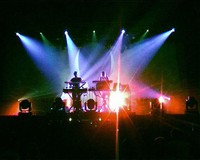System 7
Author: Jo Vraca
Thursday, September 13, 2001

At that time, Hillage was a young member of the band that heralded the new sounds that were emanating from beyond the traditional noise generators such as guitars and drums. "There are a few sounds that are prevalent in today's dance music that we pioneered, along with other European electronic bands. We thought it [techno] was going to get big. We thought it was the next step. A big moment for me, I remember very clearly, it was 1977 in a club and they played a Kraftwerk track, 'Spacelab'. People were dancing. Before that, we used to sit cross-legged and roll big fat joints. The fact that people were dancing to techno was a big moment."
But while Georgio Moroder was stealing everyone's attention at the discos, techno was beginning to present rock audiences an alternative listening experience. "It was part of a wider mood. Disco music could be really cool and really intellectual instead of just pop. For me, that was just the tip of the iceberg. Although I will add one thing, one of the things I love about dance music is that it's always changing and every six months is a kind of year zero. Things are quite unpredictable in dance music." At the time, when a bleep from a small black box would have excited most musicians, techno was conceived as the next step in music's revolutionary evolution - just like (James Brown's drummer) Clyde Stubblefield's funky drummer break and Elvis' thrusting pelvis (well it was revolutionary in the 50s and 60s!). "You've got to remember that from an intellectual point of view, one very good comment is that a really good dance music event with really top DJs with a large percentage of people dancing in the crowd is a genuinely interactive event. It's more progressive than the static, rather boring spectacle of a bunch of 'stars' on stage and its band of disciples in the audience. To me that's really sterile. There's a shamanic side of dance music which I think has almost vanished from rock music."
While Hillage has travelled through the decades in various guises, as guitarist in a rock band (Gong), soloist (The Steve Hillage Band) and dance music producer, he acknowledges that unlike its predecessor the 80s, the 90s will be looked upon with much less disdain in the years to come. After all, it was the decade which inspired even the most frivolous of pop performers to come to grips with the technology that dance music has proffered. "I think the 90s was a good period. Funny enough, there's a bit of an 80s chic happening at moment. Have you heard of a French producer called Mirwais [Ahmadzaï]- He produced some of the new Madonna album. He's done his own album. It's a very modern sounding album but it has an 80s sound, kind of like Daft Punk meets the Human League. I tend to look back on the 80s as being rather a poor period really but when you look back on it in detail, it was actually the time when the house music revolution occurred in Chicago."
In 1990, after a spate of solo albums in the 70s and 80s, Hillage was recruited back into the music scene by The Orb's Alex Patterson who has continued to be an inspiration for him. "He had a hand in persuading us to start off. He's got one of those special gifts. He's a really great DJ." Along with Miguette Giraudy (a former film maker in France whose films 'More' and 'La Vallee' feature Pink Floyd soundtracks), his musical and life partner, Hillage formed System 7 (to make "psychedelic party music for party people and people who want to get high") and released their first single 'Sunburst' in 1990. A self-titled debut album followed in 1991, the first of seven albums, and included production credits by the likes of Alex Patterso Tags

